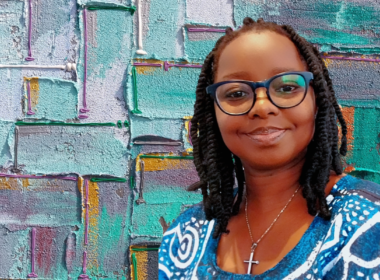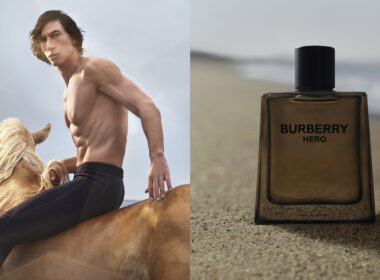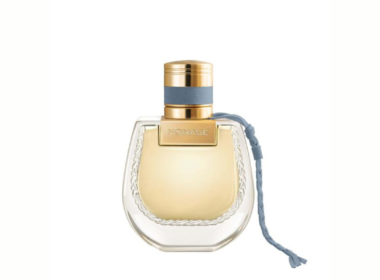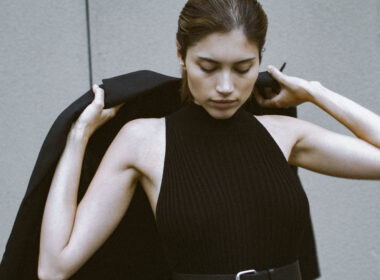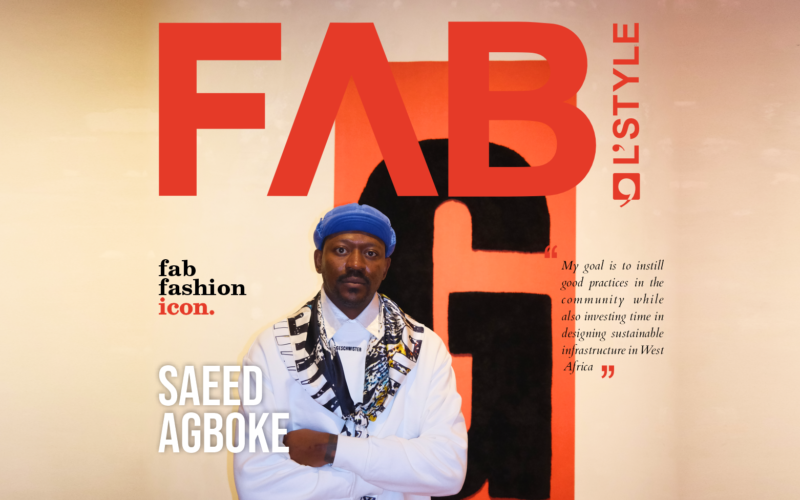In this insightful conversation, Saeed Agboke, founder of the avant-garde fashion brand Geschwister, delves into the intricate blend of fashion, technology, and sustainability that defines his work. Agboke offers a unique perspective on wearable technology and Geschwister’s celebration of diversity through innovative designs. Agboke discusses his commitment to sustainable practices while also reflecting on his creative process, the challenges of the fashion industry, and his aspirations for cultural integration and architectural impact in West Africa. This interview provides a deep dive into the ethos of Geschwister and the brain behind it, showcasing a brand that intertwines art, design, and social consciousness.
FAB: What are your thoughts on fashion and technology, especially in terms of wearable technology and smart textiles?
Saeed Agboke: I think that with the direction that our society is going, further innovation is inevitable. Just like the collaboration between art and technology, I am excited to see what’s to come in the future. Something that has piqued my interest recently is thermochromic clothing or material, which changes colour in relation to the temperature of the urroundings. It’s something I’d love to play around with in my future collections.
I guess also that the depth of knowledge that comes with mixing fashion with technological advancement coincides with sustainability and more environmentally conscious outputs, which is crucial for the future, especially when talking about waste. Stay up to date on the latest in fashion, arts, beauty, and lifestyle by following FAB L’Style Magazine.
FAB: You mentioned before that fashion is where art meets design. How does Geschwister incorporate elements of art and design into its clothing pieces?
Saeed Agboke: Geschwister showcases unique artworks by artists known as “Gesch” exclusively within the brand. Some pieces in our streetwear collection, such as the Back Archer and Warzone T-shirts, feature a combination of print and embroidery. This technique ensures that the print in elastic areas (like the collar) does not become oversaturated when stretched, therefore enhancing the artwork and making certain areas focal points, especially when turned inside out. This mixture of techniques adds levels and texture to the garments.
It also allows for diverse outcomes, making each piece unique after multiple wears and washes. The continuity of the prints ensures they flow seamlessly across different fabrics, complemented by our cream-on-white, low-visibility labels that shy away over-branding. The aim with such unique designs is for the art to be recognised as Geschwister without relying on the brand name or logo. Also, while I have my own interpretations of Gesch’s artwork, I enjoy hearing others’ views, especially when our perspectives align.
Relating this question to your last, I would say that the design implementation of the signature artwork on the “in your shoes” T-shirt allows me to provoke and express my thoughts, even if through irony.
FAB: Can you describe how Geschwister employs sustainable practices in its manufacturing processes, particularly as a member of the Better Cotton initiative?
Saeed Agboke: From the start, we identified the niche where we wanted to position the brand, ensuring every product was a work of art down to the details. With sustainability in mind, we decided to produce limited pieces, capping each design at 250 units, with half in the initial order and the remainder in the restock to avoid overproduction. This also respects the original 1/1 artwork while offering a diverse range of items. I guess I don’t like the idea of thousands and thousands of the same item being circulated in the same location; however, in reducing that factor, it may just be the catalyst for driving new interactions or friendships, especially understanding how limited Geschwister items are.
To ensure high-quality, sustainable production of Geschwister goods, we partnered with a fabric mill in Turkey that is part of the Better Cotton Initiative (BCI). This multi-stakeholder initiative aims to make global cotton production more sustainable and ensure our products adhere to our sustainability guidelines. Other sustainable measures include reducing the amount of elastic in Geschwister fabrics and maintaining 100% cotton, which our research shows can disintegrate up to 85% when left in a compost heap or wastewater for over a year.
Saeed Agboke: I’d have to highlight the show in Paris last June, where the schedule was disrupted due to a conference that overran its allotted time, preventing us from accessing the section allocated for the models to get ready. In “protest,” I declined the makeshift option suggested, as I felt it would inconvenience everyone involved. Long story short, I had faith in our incredible team, some of whom had flown in from other countries that day to assist. I also chose not to rehearse, as I didn’t want the early crowd to prematurely hear the unreleased album by the multitalented artist GAUNT, which we used for the show (special thanks to GAUNT). Overall, it was an epic experience, and we put on the best show.
FAB: What are some common misconceptions about the fashion industry that you’d like to dispel?
Saeed Agboke: The correlation between producing great-quality clothing and achieving success doesn’t equate to the relationship between cost and durability. Opting for cheaper clothing may not always be the best investment if you find yourself having to purchase it repeatedly.
FAB: What are your thoughts on the rise of conscious consumption and the demand for transparency in fashion?
Saeed Agboke: I believe this is a positive direction for the industry, one we should all embrace, not only for sustainability reasons but also due to the increasing health risks associated with certain materials. It’s quite bizarre that some of the most luxurious brands use cheap and toxic materials that have long-term health effects. Fortunately, more sports brands are conducting research and implementing changes, though this progress isn’t widely discussed in the industry.
Regarding transparency, the industry still has a long way to go. Issues like child labour, unfair compensation due to profit margins, and overproduction and waste in fast fashion are prevalent. Black Friday, for instance, gives me anxiety! As a new brand, addressing some or all of these issues can quickly set you apart from competitors, especially as consumers become more educated on these topics.
I personally believe it is within our power to consume less and invest in quality clothing—whether new, vintage, or thrifted. However, this shift requires the support of the wider community, not just the fashion industry.
FAB: How do you source materials and production methods that align with your brand values and ethos?
Saeed Agboke: It’s about understanding that there are a lot of manufacturers all around the world that could provide you with any fabric that you want. It’s more about delving deeper and understanding the output of the individual manufacturers that you’re working with, how the fabric is put together, and the working conditions, which are incredibly important.
I’ve got plans to visit the factories towards the end of the year just to make sure that all we talked about when producing the first collection is still present. It’s quite easy to take people’s words for things, but it’s also up to the individual to do their due diligence and understand that there’s a lot of things that’s impacting society, and if we cannot contribute to reducing those negative things, then we will be at fault.
Individuals around the world need to do better. It comes from companies in general, especially corporate companies. When you’re on the road to expanding a company, there are things you really need to understand. You need to understand the source of products, how they’re affecting the community, and whether you can contribute to improving the community. That’s something that’s quite prominent in my mind.
FAB: How do you foster cultural innovation and creativity within your brand and organisation?
Saeed Agboke: It closely aligns with the ethos stated in the brand’s mission statement, which emphasises the importance of listening and observing. At this point in my life, I deeply appreciate firsthand experiences and connecting with people in the different countries I visit, especially within the skate community. This community is at the forefront of integration, using the universal language of skateboarding to immerse itself in large multicultural groups.
While I can’t pinpoint direct cultural influences from my roots in this current collection, others are still able to relate to the art work and designs and see parts of their own culture in Geschwister. Being immersed in Nigeria’s rich culture, juxtaposed with my upbringing in the UK, empowers me to explore innovative concepts by blending insights from diverse cultural perspectives I’ve encountered, highlighting both the contrast and the similarities.
Geschwister resonates directly with multiple cultures—German, Austrian, Polish, British, and Nigerian—reflected through my own heritage. The goal is to bring individuals from these varied backgrounds together to engage in transformative dialogues. My research is what took me to this part of the world—Berlin and Vienna—for the first time, having only visited Germany as a child. I felt it was important to focus on understanding and analysing the reaction of a Nigerian-British designer owning a fashion label called Geschwister.
Saeed Agboke: I’ve come to realise that it’s impossible to achieve everything in ’24 hours’. To quote Clint, one of the most influential designers of my generation, “it takes 10 years to become an overnight success.” This perception highlights the difference between how the public views the rise of a brand and how the designer experiences it. For Geschwister, the journey began in 2016 and has been a work in progress until our launch in October 2022, with the dialogue still ongoing.
I believe how you react to setbacks is crucial and contributes significantly to growth. Understanding that there are multiple paths to success enhances one’s ability to process and adapt. People often underestimate the power of observation. Much of creativity is perceived through our eyes. Few can sit in a room for 12 straight hours and be 100% productive, so I advocate spending 80% of the time observing and listening and 20% executing ideas. It’s impossible to force creativity and be truly content with the result.
FAB: What legacy do you hope to leave behind in the fashion industry?
Saeed Agboke: I have always had a keen interest in exploring the correlation between space and integration. With the ethos of Geschwister, I hope to instill good practices in the community while also investing time in designing sustainable infrastructure in West Africa.
To focus on what architecture and design really do to the community, in the sense of the community being overwhelmed by a figure or a transformation enabling them to thrive beyond their struggle caused by corruption.
More Like This:
